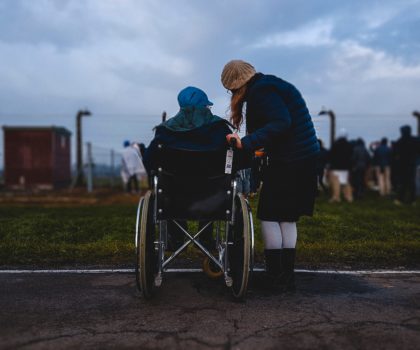If you have recently dealt with losing a loved one, especially the passing of a spouse, one of the last things that you are likely thinking about is moving on. However, this is one of those elderly issues that you will need to start thinking about at some point in the near future. There are few things in life that are more difficult than losing a loved one. However, in order to preserve and maintain your own health, at a certain point it is crucial to point your attention towards a positive new future for yourself.
Step One for Losing a Loved One- Give Yourself Time to Grieve
In the weeks after your spouse passes away, you certainly should not be thinking about anything else but just making it successfully through each and every day. It is completely normal to be full of all kinds of emotions. Some experts point out that it can take about five years before people start to feel more like themselves. So if you feel as though you aren’t recovering quickly enough, take it easy. Don’t blame these feelings on yourself and give yourself time. Don’t try to stop yourself from crying and remind yourself that crying is OK.
Step Two for Losing a Loved One- Notice Joyful Moments
Depression is very prevalent among elderly issues that seniors face. That is part of why it is so very important to start internalizing positive thoughts. Even if they are small, you should take time out to appreciate them fully. If you can just learn to seek out and experience these happy moments when they occur, you will eventually find that there are more and more joyous moments in your life.
Consider Adding a New Friend to the Family
Try to spend time in nature. Pets can bring a lot of joy to their owners and that is why pet therapy can be so very effective. They provide laughs, and loving companionship and can help bring some brightness into the lives of those who have dealt with losing a loved one.
Step Three for Losing a Loved One- Consider a Bereavement Group to Discuss Elderly Issues
Many people find that when they are in pain or grieving, they want to be on their own. However, the fact is that humans by nature are social animals. An important part of the healing process is being around others who understand and who care. At this stage in your process, consider joining a support group. If you can find one dedicated to discussing elderly issues revolving around losing a loved one, that is even better. Often over 55 communities offer these types of services.
Another thing that you can do is to consider counseling. Counseling can be very effective in allowing you to share your feelings in a non-judgmental setting.
Step Four for Losing a Loved One- Take Time Out for Yourself
Seniors have more needs and issues that need to be addressed. For example, you need to make sure you continue to take care of yourself. This means that you should be sure to get enough rest and eat nutritious meals. If you find that you can’t accomplish this on your own, ask for help. You may very well find someone willing to help you prepare meals or who will be your new “exercise buddy.” These types of senior activities can do wonders in enabling people to feel better.
Step Five for Losing a Loved One- Create Rituals that Are Comforting
If you can develop some rituals that help you to remember your spouse in a positive and peaceful way, then they are well worth developing. For example, you can create a fun celebration to celebrate your anniversaries so that you won’t be alone. Another activity you could try is looking through old photo albums with your children.
Remember that there is no one right way or wrong way to grieve. Everyone is different and will go through this process in a different way. Be sure that you remind yourself that losing a spouse is a unique experience for everyone, and that all your feelings and emotions are valid and healthy.





